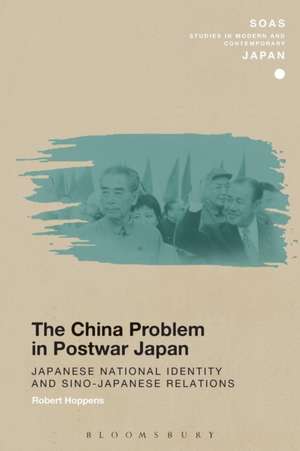The China Problem in Postwar Japan: Japanese National Identity and Sino-Japanese Relations: SOAS Studies in Modern and Contemporary Japan
Autor Robert Hoppensen Limba Engleză Paperback – 27 iul 2016
| Toate formatele și edițiile | Preț | Express |
|---|---|---|
| Paperback (1) | 259.07 lei 43-57 zile | |
| Bloomsbury Publishing – 27 iul 2016 | 259.07 lei 43-57 zile | |
| Hardback (1) | 775.43 lei 43-57 zile | |
| Bloomsbury Publishing – 28 ian 2015 | 775.43 lei 43-57 zile |
Din seria SOAS Studies in Modern and Contemporary Japan
- 21%
 Preț: 218.00 lei
Preț: 218.00 lei - 30%
 Preț: 510.25 lei
Preț: 510.25 lei - 23%
 Preț: 228.76 lei
Preț: 228.76 lei - 22%
 Preț: 231.63 lei
Preț: 231.63 lei - 30%
 Preț: 539.84 lei
Preț: 539.84 lei - 23%
 Preț: 228.94 lei
Preț: 228.94 lei - 22%
 Preț: 256.85 lei
Preț: 256.85 lei - 21%
 Preț: 218.74 lei
Preț: 218.74 lei - 13%
 Preț: 231.89 lei
Preț: 231.89 lei - 30%
 Preț: 540.54 lei
Preț: 540.54 lei - 22%
 Preț: 225.59 lei
Preț: 225.59 lei - 22%
 Preț: 241.15 lei
Preț: 241.15 lei - 21%
 Preț: 235.20 lei
Preț: 235.20 lei - 13%
 Preț: 257.97 lei
Preț: 257.97 lei - 30%
 Preț: 597.56 lei
Preț: 597.56 lei - 22%
 Preț: 257.97 lei
Preț: 257.97 lei - 21%
 Preț: 218.74 lei
Preț: 218.74 lei - 22%
 Preț: 256.95 lei
Preț: 256.95 lei - 30%
 Preț: 540.96 lei
Preț: 540.96 lei - 22%
 Preț: 224.94 lei
Preț: 224.94 lei -
 Preț: 323.57 lei
Preț: 323.57 lei - 30%
 Preț: 656.90 lei
Preț: 656.90 lei - 12%
 Preț: 259.52 lei
Preț: 259.52 lei - 21%
 Preț: 218.18 lei
Preț: 218.18 lei - 22%
 Preț: 256.59 lei
Preț: 256.59 lei - 21%
 Preț: 218.47 lei
Preț: 218.47 lei - 30%
 Preț: 567.75 lei
Preț: 567.75 lei - 13%
 Preț: 250.92 lei
Preț: 250.92 lei
Preț: 259.07 lei
Preț vechi: 296.22 lei
-13% Nou
Puncte Express: 389
Preț estimativ în valută:
49.59€ • 53.88$ • 41.68£
49.59€ • 53.88$ • 41.68£
Carte tipărită la comandă
Livrare economică 21 aprilie-05 mai
Preluare comenzi: 021 569.72.76
Specificații
ISBN-13: 9781474298643
ISBN-10: 1474298648
Pagini: 312
Dimensiuni: 156 x 234 x 17 mm
Greutate: 0.44 kg
Ediția:NIPPOD
Editura: Bloomsbury Publishing
Colecția Bloomsbury Academic
Seria SOAS Studies in Modern and Contemporary Japan
Locul publicării:London, United Kingdom
ISBN-10: 1474298648
Pagini: 312
Dimensiuni: 156 x 234 x 17 mm
Greutate: 0.44 kg
Ediția:NIPPOD
Editura: Bloomsbury Publishing
Colecția Bloomsbury Academic
Seria SOAS Studies in Modern and Contemporary Japan
Locul publicării:London, United Kingdom
Caracteristici
Draws on a wealth of Japanese and Chinese sources, many of which have only recently become available
Notă biografică
Robert Hoppens is Assistant Professor in the Department of History & Philosophy at the University of Texas Pan-American, USA.
Cuprins
IntroductionPart I: The China Problem in Postwar Japan 1945-1970Chapter 1: The China Problem in Postwar Japanese Foreign PolicyChapter 2: The China Problem and Postwar Japanese National IdentityPart II: The Nixon Shock and the Normalization of Relations 1971-1972Chapter 3: The Politics of the Nixon Shock and the Normalization of Relations Chapter 4: The China Problem in a New EraPart III: The Anti-Hegemony Issue 1973-1976Chapter 5: The Anti-Hegemony Issue: Japan and the Sino-Soviet Cold WarChapter 6: The China Problem in a Time of Crisis and AdaptationPart IV: From the Peace Treaty to Economic Cooperation 1977-1979Chapter 7: The Diplomacy of Peace and CooperationChapter 8: Conservative Triumphalism and the China ProblemEpilogue: Toward the "History Problem"ConclusionBibliographyIndex
Recenzii
This review cannot do justice to the author's wide-ranging analysis of the nationalist discourse by many Japanese intellectuals and political leaders and its linkage to Japan's China policy ... This book is a major contribution to the study of post-war Japan-China relations ... Written and structured well, it will assist students as well as researchers to better understand the tortuous development of this important bilateral relationship.
Hoppens' argument is backed by a solid base of Japanese, Chinese and English-language primary and secondary sources ... Hoppens is to be applauded for not merely relying on the "official" sources ... [as] in moving beyond just the "official" position, readers get a much more rich, nuanced analysis of how the Japanese general public viewed China in the 1970s ... [This book] will be the standard to which those interested in this period of Sino-Japanese relations first turn for the foreseeable future.
Richly detailed, the book is by far the most comprehensive English-language diplomatic history of this pivotal period in Sino-Japanese relations and the transformation of Japan's post-war national identity.
The book will be of great interest to anyone concerned with Sino-Japanese relations.
Very well researched ... A lucid and reasoned approach to important issues ... A very welcome addition to the large literature on Japanese "identity" and Japan's political discourse.
How China and Japan have regarded one another since 1945 has led to the expenditure of much ink, but the search for the right words to make sense of it all remains incomplete. As arguably the most important bilateral tie in East Asia-between the world's second and third largest economies, and two mighty militaries-an explanation is as desirable as it is necessary. Hoppens goes a long way toward that end with this book, especially in assessing the decade of the 1970s and addressing the ramifications of cataclysmic defeat on Japan's postwar national identity. He takes beyond Sino-Japanese diplomatic normalization, even touching on the debates over "history" that occupied many a mind in the early 1980s. For those interested or concerned with the China-Japan relationship, this book deserves our cogitation.
The China Problem in Postwar Japan is a fresh and ambitious new look at the complexities of the relationship that postwar Japan has pursued with its giant neighbor, China. Linked by geographic proximity as well as a shared history, Japan's leaders have always faced the challenge of adroitly maneuvering a foreign policy with China that would maximize Japan's national interests while also balancing domestic concerns (trade and national security) and its alliance with the United States. Utilizing a trove of archival material from Japan, China, and the US, Hoppens does a fine job of illuminating both the success and failures of Japan's quest in dealing with this so-called "China problem." This is a must read for not only those interested in postwar Sino-Japanese relations, but also for policy-makers who need to garner further insight into what kind of future awaits East Asia with a bolder and more confident China and a wary Japan that is increasingly leaning towards a more proactive security policy.
An excellent book ... We strongly recommend that you keep this book in the libraries of major universities.
Hoppens' argument is backed by a solid base of Japanese, Chinese and English-language primary and secondary sources ... Hoppens is to be applauded for not merely relying on the "official" sources ... [as] in moving beyond just the "official" position, readers get a much more rich, nuanced analysis of how the Japanese general public viewed China in the 1970s ... [This book] will be the standard to which those interested in this period of Sino-Japanese relations first turn for the foreseeable future.
Richly detailed, the book is by far the most comprehensive English-language diplomatic history of this pivotal period in Sino-Japanese relations and the transformation of Japan's post-war national identity.
The book will be of great interest to anyone concerned with Sino-Japanese relations.
Very well researched ... A lucid and reasoned approach to important issues ... A very welcome addition to the large literature on Japanese "identity" and Japan's political discourse.
How China and Japan have regarded one another since 1945 has led to the expenditure of much ink, but the search for the right words to make sense of it all remains incomplete. As arguably the most important bilateral tie in East Asia-between the world's second and third largest economies, and two mighty militaries-an explanation is as desirable as it is necessary. Hoppens goes a long way toward that end with this book, especially in assessing the decade of the 1970s and addressing the ramifications of cataclysmic defeat on Japan's postwar national identity. He takes beyond Sino-Japanese diplomatic normalization, even touching on the debates over "history" that occupied many a mind in the early 1980s. For those interested or concerned with the China-Japan relationship, this book deserves our cogitation.
The China Problem in Postwar Japan is a fresh and ambitious new look at the complexities of the relationship that postwar Japan has pursued with its giant neighbor, China. Linked by geographic proximity as well as a shared history, Japan's leaders have always faced the challenge of adroitly maneuvering a foreign policy with China that would maximize Japan's national interests while also balancing domestic concerns (trade and national security) and its alliance with the United States. Utilizing a trove of archival material from Japan, China, and the US, Hoppens does a fine job of illuminating both the success and failures of Japan's quest in dealing with this so-called "China problem." This is a must read for not only those interested in postwar Sino-Japanese relations, but also for policy-makers who need to garner further insight into what kind of future awaits East Asia with a bolder and more confident China and a wary Japan that is increasingly leaning towards a more proactive security policy.
An excellent book ... We strongly recommend that you keep this book in the libraries of major universities.








